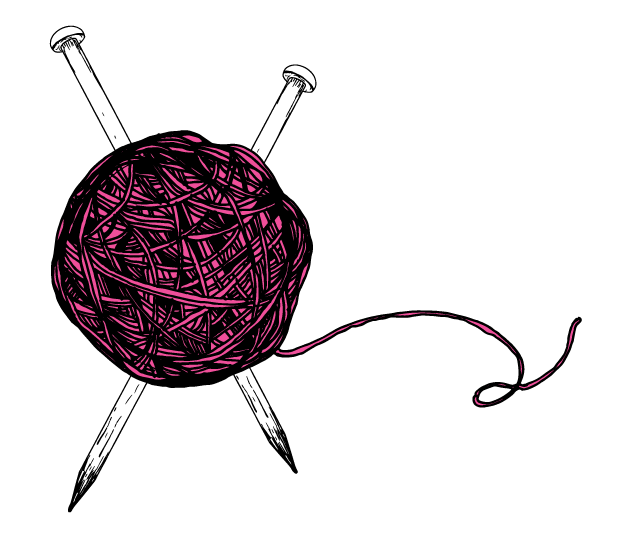Knitted Knockers
Supporting breast cancer survivors
STORY BY ISAAC SCHOENFELD | PHOTOS BY NICK DANIELSON | INFOGRAPHIC BY HEATHER-MARIAH DIXON
(above) Knitted Knockers founder, Barbara Demorest, leads weekly meetings with women who volunteer to make knitted knockers for others. The meetings take place on Wednesdays in Apple Yarns a shop located in Bellingham. The shop has helped support Knitted Knockers through hosting events, supplying knocker kits, and donating to the organization.
Good morning wonderful knitters,
I had a mastectomy by Dr. Cary Kaufman on July 31.
When I asked him what I put in my bra cup after surgery, he brought a bag of knitted knockers. He said that most of the nude colors were gone, but I found the perfect one for me. It was a brighter diamond than the rest. It is hairy, bright orange, with colorful specks on it.
It works perfect for me, and when I show people they are amazed at the beauty and cleverness of the creation. And, of course, the name.
From the bottom of my heart and knocker, thank you so much for knitting these for us breast cancer survivors. It is truly a labor of love and prayers that we feel when we wear them.
Knocker on.”
“That email just tickled me,” Barbara Demorest says, reflecting on one of countless testimonies received over the past three years since founding Knitted Knockers.
The nonprofit has developed over the past three years. It is an organization that connects volunteer knitters with breast cancer survivors for a free, often temporary, alternative to breast prosthetics.
The concept started with a small group of knitters in Whatcom County and now spans 20 volunteer groups in 13 states and nine countries.
In 2011, Demorest underwent her own mastectomy after being diagnosed with breast cancer.
She hadn’t told her friends she was going under the knife. It was too embarrassing. She didn’t want them to worry.
“I figured I’d wake up like normal,” she says. “But that didn’t happen.”
She wasn’t able to have her breast reconstruction right away.
“That was the first time that I cried,” she says. “I didn’t have any of the resources or support from friends because I hadn’t told anybody.”
She can still hear the voice on the other end of the phone from the local cancer society.
“Oh, honey,” they said. “You won’t be able to put anything over that scar for at least six weeks.”
Six weeks? She had to get back to work. Get back to life.
IN 2015, IT IS ESTIMATED THAT AMONG U.S. WOMEN THERE WILL BE 231,840 NEW CASES OF INVASIVE BREAST CANCER

Source: Susan G. Komen Foundation
It wasn’t until she was sitting in the waiting room of her local clinic, reading through a brochure for breast prosthetics, that her answer came.
“Most women aren’t happy with that solution,” her doctor told her. Most traditional prosthetics are hot, heavy and expensive. “But do you knit?”
Not well enough to knit a knocker herself, Demorest enlisted the help of her close friend and expert knitter, Phyllis Kramer. It was the following week when Kramer brought a pair of knitted breasts in a little Victoria’s Secret bag and passed it on to Demorest’s husband.
“Just give this to Barbara,” she said.
Demorest went to the bathroom and shed the heavy coat she wore to hide her chest.
“I put one in my bra and for the first time since my surgery I felt normal,” she says. “I could get a hug without feeling awkward.”
Bellingham’s Apple Yarns is owned and ran by Andrea Evans, a long-time friend of Demorest and a member of the Knitted Knockers board.
Apple Yarns has become the host of Knitted Knocker events (including a weekly group, Wednesday mornings at 10:30) and a major drop-off point for knitters to donate completed knockers.
The act of giving a knocker has also become a great way for knitters who are indirectly affected by the disease, Demorest said. It’s a way to cope by reaching out to loved ones, or even a stranger in need.
“It’s something you can do without a huge investment,” Evans says. “A lot of us can knit a knocker faster than we can make a dinner.”
The proportion of women treated with mastectomies has decreased from 40.8 percent in 2000 to 37 percent in 2006, according to the American Society of Clinical Oncology, but Knitted Knockers is expanding to meet the huge demand for knockers that one group can’t meet alone.
“My goal is to help develop a plan for other stores to reach out to their communities,” Evans said. “To help other stores see that by doing good, it comes back to you. I think that’ll be a great way for Barb to expand.”
Demorest’s one-year plan is to expand Knitted Knockers into all 50 states, and to supply at least two clinics per state with knitted knockers within the next three years.
“[Knitting knockers] gives something to look forward to,” Demorest says. “To look out and to help others. I think that’s an important part of recovery.”
